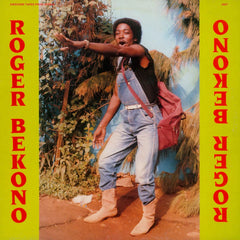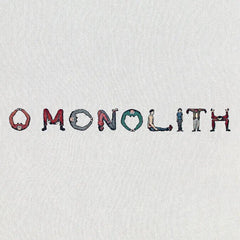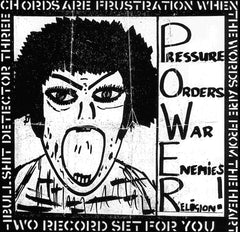New Releases for Friday 16th June 2023
There are only a few new releases in store this Friday, but we do have a big one! It is the 8th studio album album by Queens of the Stone Age - In Times New Roman. We have this in standard black and also in varying colours, so check out our website for more info.
In Times New Roman... is raw, at times brutal and not recommended for the faint of heart. And yet, it’s perhaps the most beautiful and definitely the most rewarding album in their epic discography. Founder Joshua Homme's most acerbic lyrics to date are buoyed by the instantly identifiable QOTSA sonic signature, expanded and embellished with new and unprecedented twists in virtually every song. With In Times New Roman… we see that sometimes one needs to look beneath scars and scabs to see beauty, and sometimes the scabs and scars are the beauty.
Feeling a bit out of place, and having difficulty finding music they could relate to, the members of QOTSA did as they are wont to do: In Times New Roman… is the sound of a band creating the music its own members want to hear, while giving the rest of us a sonic forum in which to congregate. “The world’s gonna end in a month or two," sings Homme, begging the question: What do you want to do to with the time you’ve got left? Homme, Troy Van Leeuwen, Dean Fertita, Michael Shuman and Jon Theodore may not be able to save us, but they’re giving us a place to ride it out.
In Times New Roman… was recorded and mixed at Homme’s own Pink Duck (RIP), with additional recording at Shangri-La. The album was produced by Queens of the Stone Age and mixed by Mark Rankin. Artwork and double LP gatefold packaging designed by long time collaborator Boneface.
Goat - Commune (Vinyl LP)
Reissue of Commune, Goat's 2014 studio album.
Commune continues on with the preceding World Music's acidic grooves, hypnotic incantations, and serpentine guitar lines but also introduces a darker, more angry edge to the band, not seen before on previous releases. Starting with the layered percussive groove, Eastern guitar flourishes, and convoking vocals of Talk To God, it re-establishes the trance-inducing rhythms and exotic blaze of guitar that characterized their debut so well. That spellbound pulse delves into darker and more propulsive territories on Words and Goatslaves, while Goatchild veers towards the transcendental pop of '60s Bay Area rock. The vintage psychedelic vibe permeates through songs like The Light Within and To Travel The Path Unknown - tracks that suggest that these rural Swedes operate on the same wavelength as the Turkish psych-folkies recently rediscovered by reissue labels like Finders Keepers. Commune reaches its apex when Goat's hymnal invocations meet a heavy doze of proto-metal fuzz on Hide From The Sun and Gathering of Ancient Tribes.
Roger Bekono - Roger Bekono (Vinyl LP)
Long out-of-print release available digitally for the first time. Extensive notes by a local writer in English and French. Previously unpublished family photos. Urbanized traditional music at a dancefloor-friendly tempo. The very definition of an "Awesome Tape From Africa". Roger Bekono made a deep mark in the contemporary history of Cameroonian music through the four-on-the-floor, ribald intensity of bikutsi. The Ewondo-language dance-pop style that forms an undulating tapestry of interlocking triplet rhythmic interplay came to international prominence in the European "world music" scene as the 90s began. But the relentless sound of bikutsi developed in Yaoundé at the hands of Bekono and many others, as it developed from a village-based singing style performed mostly by women into a cosmopolitan music force that rivaled the popularity of established musics like Congolese rhumba, merengue and makossa. With his unique—some say suave—voice, Bekono contributed much over a period of more than 10 years as part of the evolution of this traditional rhythm-turned-urban dance movement. Bekono worked with legendary producer Mystic Jim, who had built a prolific home studio along with a crack team of musicians. They joined as part of the production of his self-titled album, which became known locally as "Jolie Poupée," the name of the album's lead single and most popular song. For "Jolie Poupée" Mystic Jim programmed the kick or bass drum, adding effects to have a heavier bass. Overall the album represented a new level of finesse and professionalism for his second release. In the middle of 1989, Jolie Poupée was released by the label Inter Diffusion System and aggressively hit the radio, discos and national television. The music video for the title track was on loop on TV. It felt like everyone was talking about it, even artists in adjacent music scenes like makossa. The album came out on vinyl and cassette and remains Bekono's best-selling recording to this day. With Jolie Poupée Bekono finally made an impact outside Cameroon as the record captured listeners in some Central African countries like Equatorial Guinea, Gabon, Republic of Congo and Sao Tome & Principe. In these countries, we find the Fang or Mfan people (also known as Ekang), Bantu-speaking ethnic groups that are also found in Cameroon. This umbrella language group includes the language in which bikutsi is mainly sung. Most of Bekono's songs are in French, Ewondo (of which Beti is a dialect) and Pidgin. The four songs on Jolie Poupée are all considered bikutsi classics. On September 15, 2016, Bekono died of a long illness at the age of 62. In the wake of his passing the media published a wave of tributes, thanking him for what he did for Cameroonian music. He was an admired musician, songwriter and guitarist, and some of his old colleagues and some of the new generation of performers showered Bekono with vibrant tributes via social media, many of which noting something to the effect of: "The artist dies but his works remain.
New Releases for 9th June
Squid - O Monolith (Vinyl LP)
Teeming with melodic epiphanies and layered sounds, Squid’s second album O Monolith is a musical evocation of environment, domesticity and self-made folklore. Like its predecessor, 2021’s critically acclaimed, UK number 4 album Bright Green Field, it is dense and tricksy – but also more warm and characterful, with a meandering, questioning nature.
Expansive, evocative and hugely varied, O Monolith retains Squid’s restless, enigmatic spirit, but it still holds surprises for those familiar with Bright Green Field. It’s a reflection of the outsized progression of a band always looking to the future. Like its namesake, O Monolith is vast and strange; alive with endless possible interpretations of its inner mysteries.
Protomartyr - Formal Growth In The Desert (Vinyl LP)
Since their 2012 debut, Protomartyr have mastered the art of evoking place: the grinding Midwest humility of their hometown, as well as the x-rayed elucidation of America that comes with their vantage.
The group’s sixth album was recorded at Sonic Ranch in Tornillo, TX with producer Jake Aron.
“The desert is more of a metaphor or symbol,” singer Joe Casey says, “of emotional deserts, or a place or time that seems to lack life.” The “growth” came from a period of colossal transition for Casey, including the death of his mother.
But life does go on, and Casey describes the great theme of Formal Growth In The Desert as an embrace and acknowledgment of that fact: a 12-song testament to “getting on with life,” even when it feels impossibly hard.
Various - Bullshit Detector Volume 2 (Vinyl LP)
Various - Bullshit Detector Volume 3 (Vinyl LP)
Crass Records, alongside One Little Independent Records, reissue their iconic three volume compilation series Bullshit Detector on 12” vinyl, available in both classic black and limited-edition grey.
Bullshit Detector was the name of a series of compilation LPs put together by the anarcho-punk band Crass and released on their own label. Three editions were released between 1980 and 1984, consisting of demo tapes, rough recordings and artwork that had been sent to the band. The sound quality of the ‘Bullshit Detector’ series was mixed and often basic, or even poor, as Crass would master the tapes directly to record without any additional production or enhancement. For Crass, the expectation of a polished performance was missing the point.
Take a listen to the playlist:







